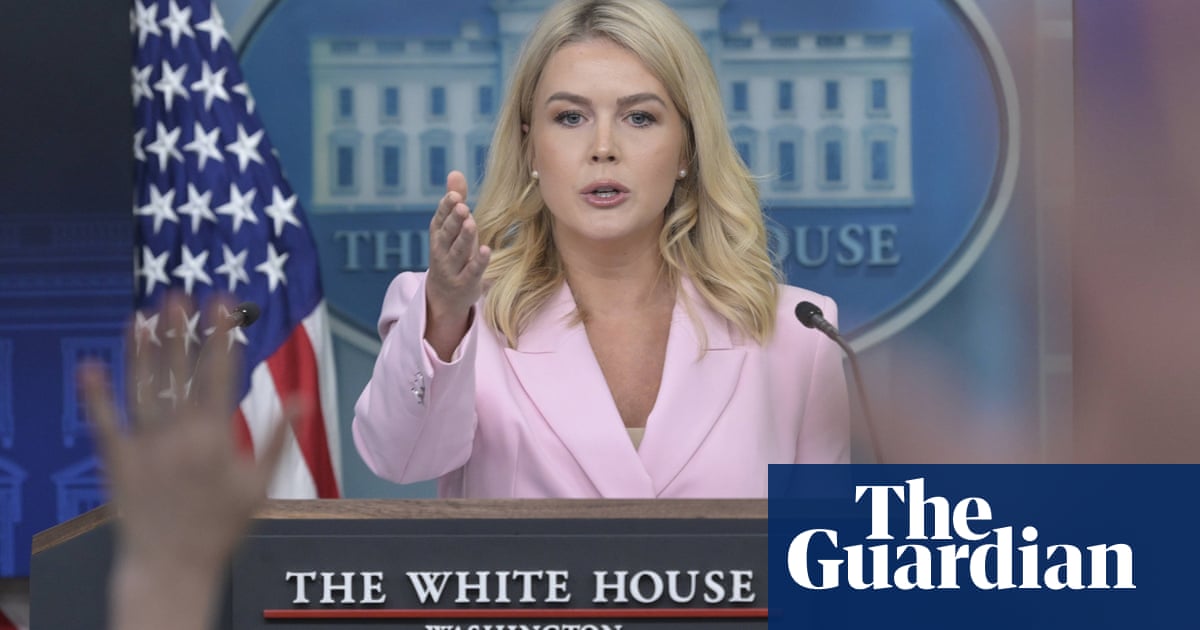A disgraced ultra-conservative banjo player ousted from his Grammy-winning band; a far-right conspiracy theorist with alleged ties toRussia; aTikTokcreator known as “Maga Malfoy” for his resemblance to the Harry Potter character; and an extremist social media “influencer” once banned from Twitter for posting a video depicting sexual abuse of a child.
These are just some of the “new media” personalities courted by the White House to take part in a series of alternative briefings championed byDonald Trump’s press secretary, Karoline Leavitt.
An extraordinary gallery of Trump-promoting characters has paraded through the West Wing in recent days, answering Leavitt’s call for “independent journalists” and “influencers” to attend her press gatherings.
Some of their fawning, softball or otherwise baffling questions have provokedderision and concern, while the topics, predictably, have covered a wide range of propaganda, conspiracy and other extremist talking points. Here are some of the highlights:
Heshowed up in the West Wingon Tuesday in a sharp black suit to first congratulate “Madame Leavitt” for inviting him, then try to gauge her position on the “quarter of a million” Britons he insisted had been penalized in the UK for social media posts or perceived speech infractions.
“Would the Trump administration consider political asylum for British citizens in such a situation?” he asked.
Leavitt, amid guffaws in the room, said the question was “a very good one” and she would “see if it’s something the administration would entertain”.
He appeared in the new media seat at a briefing last week, dressed in a black woolly hat and hoodie, to castigate “legacy media” for promoting what he said were a succession of anti-Trump “hoaxes”, including the story ofKilmar Ábrego García, who was wrongly deported to El Salvador.
His question, such as it was, was another attack on the mainstream media: “I’m wondering if you can comment on their unprofessional behavior as well as elaborate if there’s any plans to expand access to new companies?”
“We want to welcome all viewpoints into this room,” Leavitt replied, declining Pool’s invitation.
One of the leading sycophants at Leavitt’s alternative briefing, he asked the press secretary:
“You’re a very high-profile young mother who seems to juggle and balance it all beautifully. What advice do you have to young parents out there who are starting their careers having kids, building familiesand trying to find that balance so desperately?”
Leavitt had no advice to offer, but was keen to point out that “there are so many new moms and dads on our senior staff, but also across the entire administration”.
His question during his brief appearance at the new media briefing was thus:
“Is there any possibility for names such as Barack Hussein Obama, Hillary Rodham Clinton, to ever possibly get investigated for … any of the wrongdoings they might have done?”
Leavitt said it was “refreshing” to hear McGee’s question. “The legacy media would never ask [it],” she said.
Her first attempt at “stirring things up in the realm of political commentary”, having been granted the honor of the opening question at Leavitt’s alternative briefing, was a racially dubious statement praising the Trump administration’s immigration crackdown.
“I can attest to the deportations in Florida, my Uber drivers finally speak English again, so thank you for that,” she enthused.
Her subsequent question demanded to know what action would be taken against “trans men … masquerading as women in girls’ sport”. Leavitt replied: “Obey the law or you will be prosecuted”.
With more than 7m followers across several social media platforms, O’Handley was warmly welcomed by Leavitt to the new media seat during a briefing that included Trump’s border enforcer, Tom Homan.
He used his opportunity to deliver a lengthy monologue endorsing Trump’s policy of deporting scores of migrants without due process, and excoriated judges who had issued orders trying to stop it.
“In Trump’s first 99 days, we’ve seen a coordinated assault on the rule of law by radical judges,” he said. “These judges are providing more due process to violent MS-13 and Tren de Aragua illegal aliens than they did for American citizens who peacefully protested on January 6.”
Would Trump consider suspending the writ of habeas corpus for such migrants? O’Handley wondered.
“The administration is open to all legal and constitutional remedies,” Leavitt said, adding that she “agreed with the premise” of his question.
